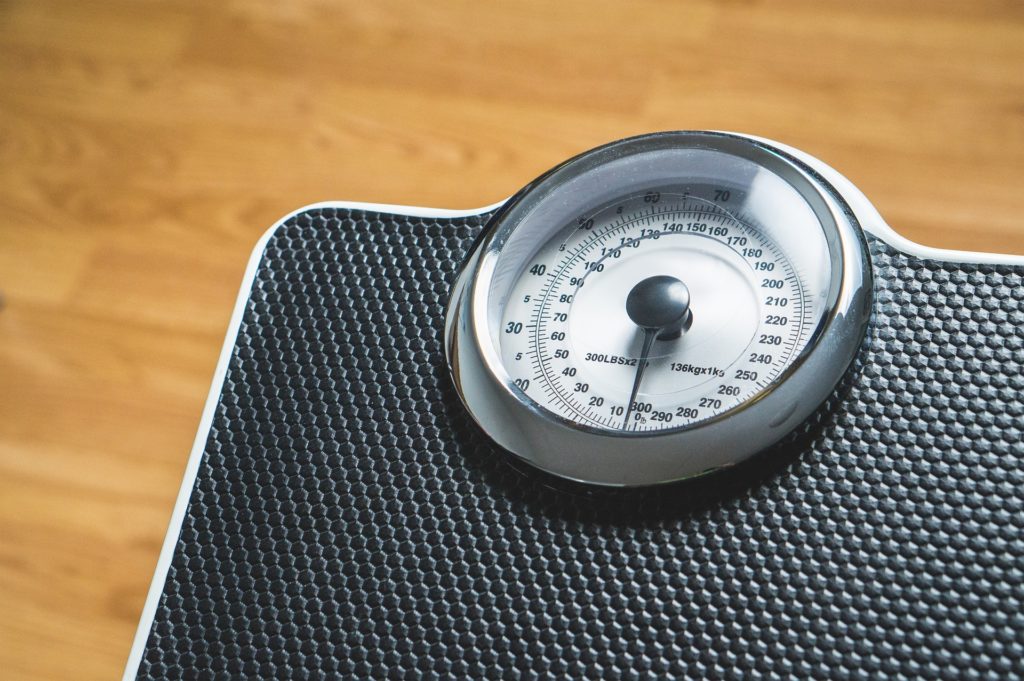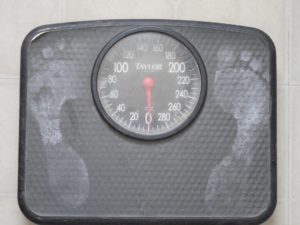- Calls to this hotline are currently being directed to Within Health, Fay or Eating Disorder Solutions
- Representatives are standing by 24/7 to help answer your questions
- All calls are confidential and HIPAA compliant
- There is no obligation or cost to call
- Eating Disorder Hope does not receive any commissions or fees dependent upon which provider you select
- Additional treatment providers are located on our directory or samhsa.gov
Does Letting GO of the Scale Make a Difference in Recovery?

Weighing one’s self can be a burden to those who have an eating disorder. It can be an obsession, a compulsion, or a way to track success or failure. Being able to let go of the scale in treatment and recovery can be a rewarding benefit.
Gravity is Vital
Weight stabilizes throughout your life. Our bodies are miraculous entities. It can self-heal, it can speak to us on aches and pains, and it drives to maintain homeostasis. The number on the scale is our gravity to the earth [1].
It is what holds us down and is the calculation of a person’s mass against the earth’s gravity and position on the globe.
Being able to remove the mental burden of continually weighing is similar to removing space within your brain to focus on priorities and joys in life. In the 1960’s two therapists developed Exposure and Response Prevention (ERP) psychoeducational treatment approach.
It was initially used for obsessive-compulsive disorders, but it helped clients reduce and prevent ritualistic behaviors found in OCD [1].
Weight is Not a Focus
Eating disorder treatment and recovery occurs over time and is not a linear process [2]. It can often be a few steps forward and a few steps back.

Many times success and progress are not weight defined but rather exposures, new experiences, and benchmarks that do not have a number involved.
Often those who are struggling with an eating disorder want something concrete to define their progress, and some goals are specific, but many are not. Weighing is exact. It gives a number, but that number can be inaccurate.
It fluctuates day-to-day and throughout the day. Scales can be wrong, broken, or not calibrated.
Weighing one’s self can also be a trigger of eating disorder thoughts and behaviors. It can bring up emotional connections to past situations or relapses. The message from the eating disorder is always clear-lower is better no matter what the cost.
The recovery process is about being able to follow a meal plan, weight restoration, and maintenance and letting go of negative thinking cycles and behaviors.
Weight restoration and maintenance, regardless of the subtype of the eating disorder, is the focus at first within the recovery process.
Our bodies will reach a biologically appropriate weight if food is normalized through following an appropriate meal plan set forth by your treatment team.
Treatment
When in treatment, typical weigh-in’s are daily to weekly, depending on the level of care. Most traditional therapies typically recommend frequent weigh-ins due to rapid weight loss, for those with anorexia, and being able to correct meal plans accordingly or behavioral interventions.
Research is showing that for those with Binge Eating Disorder, frequent weigh-in’s can be a way to maintain or monitor healthy eating and weight stabilization.
Previous research has shown that with daily weighing, it does not promote continued weight loss, but can have some success in keeping weight gain from reoccurring in those struggling with binge eating [3].
There are adverse effects to frequently weighing though. It can promote an eating disorder or trigger the relapse of one. Mood shifts, anxiety, and depression can all be affected by a constant focus on weight gain, loss, or no shift at all.
Increases in body dissatisfaction and food obsession can also be triggered or emerge from daily or frequent weighing.
In other previous studies, it was observed that self-weighing was associated with an increase in restriction of food intake and a decrease in disinhibition and depressive symptoms [3].
In 2012 a study looked at over 2,000 young adults to measure healthy behaviors. 18% of females and 12% of males weighed themselves a few times per week and researchers saw significant correlations between self-weighing and unhealthy weight-control practices [3].
It was also concluded that those who did monitor their weight a few times per week or more, struggled with increased depressive symptoms, especially in women, and poorer body satisfaction in men compared to peers who did not monitor their weight.
Scale or No Scale?
Using weigh-in’s within the therapeutic environment can be beneficial, especially if eating disorder behaviors or thoughts are significant. In recovery, however, the process of weigh-ins may not be needed as frequently.

Using other methods besides weight to gauge the progress of recovery is recommended. Helping a client focus on other positives, successes, and new experiences are equally, if not more important, than the number on the scale.
When in your recovery process, focus on what successes you have achieved. Have you tried new foods, followed your meal plan for several days in a row, or learned new healthy coping skills for distress tolerance and emotional regulation?
Being able to look at the ways treatment benefits you and how your thoughts turn to other areas rather than just body size and weight is a true success within recovery.
Focus on what you are gaining in all areas of your life, not just on the scale.
 About the Author: Libby Lyons is a Licensed Clinical Social Worker and Certified Eating Disorder Specialist (CEDS). Libby has been practicing in the field of eating disorders, addictions, depression, anxiety and other comorbid issues in various agencies. Libby has previously worked as a contractor for the United States Air Force Domestic Violence Program, Saint Louis University Student Health and Counseling, Saint Louis Behavioral Medicine Institute Eating Disorders Program, and has been in Private Practice.
About the Author: Libby Lyons is a Licensed Clinical Social Worker and Certified Eating Disorder Specialist (CEDS). Libby has been practicing in the field of eating disorders, addictions, depression, anxiety and other comorbid issues in various agencies. Libby has previously worked as a contractor for the United States Air Force Domestic Violence Program, Saint Louis University Student Health and Counseling, Saint Louis Behavioral Medicine Institute Eating Disorders Program, and has been in Private Practice.
Libby currently works as a counselor at Fontbonne University and is a Adjunct Professor at Saint Louis University, and is a contributing author for Addiction Hope and Eating Disorder Hope. Libby lives in the St. Louis area with her husband and two daughters. She enjoys spending time with her family, running, and watching movies.
References:
[1] Weighing Yourself: Don’t Do It. (n.d.). Retrieved October 07, 2017, from https://www.edinstitute.org/blog/2015/11/20/weighing-yourself-dont-do-it[2] LN, E. C. (2016, June 21). Throw Out Your Scale in Eating Disorder Recovery. Retrieved October 07, 2017, from https://www.recoverywarriors.com/throw-scale-eating-disorder-recovery/
[3] Pacanowski, C. R., Bertz, F. C., & Levitsky, D. A. (2014). Daily Self-Weighing to Control Body Weight in Adults: A Critical Review of the Literature. Retrieved October 09, 2017, from https://www.ncbi.nlm.nih.gov/pmc/articles/PMC4846305/
The opinions and views of our guest contributors are shared to provide a broad perspective of eating disorders. These are not necessarily the views of Eating Disorder Hope, but an effort to offer discussion of various issues by different concerned individuals.
We at Eating Disorder Hope understand that eating disorders result from a combination of environmental and genetic factors. If you or a loved one are suffering from an eating disorder, please know that there is hope for you, and seek immediate professional help.
Published on November 20, 2017.
Reviewed By: Jacquelyn Ekern, MS, LPC on November 20, 2017.
Published on EatingDisorderHope.com

The EatingDisorderHope.com editorial team comprises experienced writers, editors, and medical reviewers specializing in eating disorders, treatment, and mental and behavioral health.

